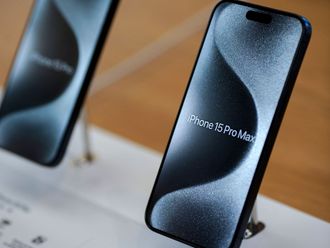Dubai: Digitisation is becoming an essential component of our daily lives, with almost half the world’s population connected to the internet, 1-1 match between the number of people on earth and the number of mobile phones.
Internet of Things (IoT) is a key driver of digitisation and is shaping our digital lives and driving various levels of progress across all sectors — health care, transport, entertainment, payments, government, etc.
Fady Kassatly, vice-president at Booz Allen Hamilton, told Gulf News that digitisation is also disrupting industries, leading to a paradigm shift in business models with some business on the decline.
He said there will a 20 per cent drop in SMS revenues over the next three years globally and 58 per cent drop in CDs sold in the last eight years while over 200 per cent increase in third party messages, example WhatsApp, over the last three years; 54 per cent increase in online music purchases over the last year.
“IoT technologies are catalysing births of a new breed of cities — Smart Cities — and changing how citizens live, work and play.”
For example, he said that Booz Allen has developed an IoT device for when a physician walks into a patient’s room, the device could automatically navigate to that patient’s record based on an RFID sensor in the patient’s hospital bracelet.
IoT and Smart Cities provide “tremendous positive impact “for governments and citizens. The social benefits are better quality of life — happy citizens, more jobs; economic benefits are increase in GDP and creation of new sectors and the environmental benefits are better utilisation of natural resources, optimisation of carbon footprint.
“Dubai has already passed the smart stage. It pushed with government services to become smarter. However, smartness has been connected to mobile phone, but this is the tip of the iceberg. We are in the beginning of the journey and we have much more to do,” he said.
Jean Turgeon, vice-president and chief technologist at Avaya, said that humanity today is witnessing an inflection point in history. There have never been more than seven billion people involved in such a transformation.
10,000 years ago, he said that the inflection point was the birth of cities, followed by urbanisation and then the industrial revolution. Today, we see the world is going through what I’d like to call the Smart Transformation, driven by disruptive trends like mobility, social, cloud and data analytics.
This smart transformation is happening at “different levels in different regions” across the world, and some societies are more innovative and advanced than others.
“The wave is there, and everyone, people, enterprise, technology providers and businesses are playing their part in its acceleration. Most of us would see this ecosystem in terms of three building blocks: smart cities that provide the infrastructure, IoT — today and tomorrow — that are going to be connected, and the enterprise and its readiness to complete the circle,” he said.
However, he said the missing fourth dimension, which only Dubai in the region is looking at, is the Green element of that ecosystem, ensuring that the transformation ultimately delivers true happiness to people.
Without an eye on the environment, “we will find ourselves in a place where things, people, businesses and governments are all connected and value creation is there, but the high price of this will be more consumption of our scarce resources,” he said.
With the Middle East’s IoT market growth outpacing the global average, the region’s IoT hardware and services revenues will reach nearly $2 billion in 2015, according to Deloitte. As the GCC diversifies its economy, the non-oil sector will grow by six per cent in 2015, according to the International Monetary Fund.
“When you look at the Dubai government’s grand goal — happiness of its residents and visitors — this has to be aligned with better health and judicious use of resources, ensuring their availability for future generations as well. Dubai’s ‘Green Economy for Sustainable Development’ vision aims for a total reduction in energy demand by 30 per cent by 2030,” Turgeon said.
This can seem ambitious, but with developments like IoT and Smart Cities, he said that a number of legacy infrastructures becoming digitised can bring Dubai much more control and intelligence over usage patterns, load and projected demand.
“Dubai is leading this move globally, and we are fortunate to be one of the 10 best companies in the world in building and bringing innovative technologies that enable the creation of greener smart ecosystems,” he said.
He said that IOT can be integrated in unlimited ways to deliver on that promise and the UAE innovation leaders are taking bold steps in that direction.
Kassatly urged government officials to partner with the private sector to embrace IoT and nurture growth of Smart Cities to benefit their citizens.










